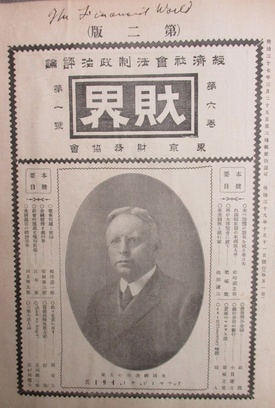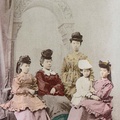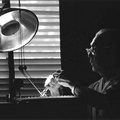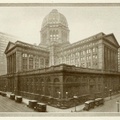In early 1901, Toyokichi Iyenaga received a letter from Edmond J. James, Professor of Public Administration and Director of the University Extension Division at the University of Chicago,1 inquiring about Iyenaga’s plan for his U.S. tour.2
3. Toyokichi Iyenaga
Iyenaga was born in 1862 to a samurai family in Fukuoka. He was taught English at missionary schools in Kumamoto and Kyoto and came to the U.S. to study at Oberlin College in November 1884. At Oberlin, Iyenaga planned lecture tours with his classmate, John R. Commons. “Their scheme was to promote a series of for-profit, Chautauqua-like lectures in Ohio towns throughout the college summer.”3 He also participated in an oratorical contest at Oberlin College on January 25, 1887, with a speech titled “Two Modes of Civilization,” and won first honors for his oration.4
After graduating in 1887, Iyenaga entered Johns Hopkins University and met Professor Ely. When Japan promulgated its constitution on February 11, 1889, Johns Hopkins University held a celebration on April 17, and Iyenaga was invited to make a speech titled “Japan’s Preparation for her Present Constitution.”5 When he returned to Japan in 1890, Iyenaga taught history and political science at several prominent universities in Tokyo, from October 1890 to the spring of 1897.6 Even while in Japan, Iyenaga maintained contact with his former teacher, Professor Ely,7 translating a part of Ely’s work, Taxation in American States and Cities with Masasada Shiozawa,8 and investigating job possibilities for Ely in Japan.9
Following a series of major events in his personal life, including marriage and divorce, Iyenaga left teaching in 1897 and worked in the Ministry of Foreign Affairs as a translator. In 1898, he left the Ministry and went to Formosa in 1899, where he conducted opium investigations as a commissioner of the Formosan government. His boss, the governor general, was Shimpei Goto. To conduct research on opium, Commissioner Iyenaga was given the opportunity to travel in western Asia, from India to Turkey, for three hundred days, from May 1899 to March 1900. He noted the extent of his travels in a letter to J.B. Pond, “Distance 22,305 miles, of which about 2,000 miles were on horseback.”10
This assignment changed Iyenaga’s life. “Active and adventurous”11 and “brilliant, ready-witted,”12 Iyenaga came back to life. He wrote to Professor Ely that “My travel last year through western and central Asia, was to one full of interest and made me learn the things Oriental great deal more than ten years study on books can teach me.”13 After this world travelling experience, Iyenaga decided to return to the U.S. Remembering the successful lecture tours of his youth, he probably thought he could sell stories about his experiences in Asia in America. From Formosa, he wrote the following letter to Professor Ely in Madison, Wisconsin asking for his help:
“I am now thinking of a trip of lecture tour through your country. I am prepared to give following lectures. 1) 5 or 6 lectures on Persia, Asiatic Turkey and India 2) One or two lectures on China 3) One on Formosa, and if need the one on Japan. If you kindly recommend me to the managers of Chautauqua assemblies or other respectable societies and if they give me fair remuneration for my service, I shall ask a leave of one year from Formosan Government, and shall have the pleasure of paying visit to my second home.”14
Upon receiving this request from his former Johns Hopkins University student, Ely wrote “to a number of colleges suggesting that they make engagements with you for lectures” and he “received a promising reply from New York University, Professor Taussig thinks that it might be practicable to make an arrangement for one or two lectures in Harvard. And you may be able to make an engagement for some lectures in Chicago.”15
Ely had probably written to University of Chicago President Harper, a man he knew very well. That was most likely why Iyenaga received a letter from Professor James of the University of Chicago in 1901. Iyenaga also received a letter dated April 9, 1901 from the Shearer Lyceum Bureau of Cincinnati, with an invitation to come to the U.S. in the middle of October.16 James E. Mosely of Madison, Wisconsin, President of the Chautauqua Assemblies Federation, to whom Ely had made inquiry, had introduced Iyenaga to Shearer Lyceum Bureau.17
Believing that his future was secured, Iyenaga left Formosa on June 25 for Tokyo, to prepare for travel to the U.S.18 He knew that he had to be back in the U.S. by October 1901, to start the lecture tour as scheduled. His new life was not easy, though. When the estate administrator of Dr. Adams at Johns Hopkins University informed him that his loan had not yet been paid off, Iyenaga had to tell Ely that “I will not return to Japan till I have discharged this duty.”19 But his life, depending so much on his contracts with Chautauqua, was not stable.
Iyenaga confessed that “My lecture prospect of the coming year is yet uncertain. Yet I have connected myself with the Winchell Lecture Bureau of Chicago. They seem to be pushing the work. They say they will make a number of engagements in New England and elsewhere, I have only to wait for the development.”20 One encouraging piece of news in the midst of his distress arrived when Iyenaga received word that his articles, “The Anglo-Japanese Alliance from the Japanese Point of View” and “Japan’s Mission in the Far East” had been published in the April 1902 The American Monthly Review of Reviews and in the June 1902 Forum, respectively.
Although we know that he “delivered five lectures at Chautauqua, NY, and at Pontiac, IL, … two lectures at Muncie before Teachers Institute” in summer 1902, we also know that Iyenaga thought that “they are not sufficient for my purpose; they only help me to keep myself floating, only not to sink.”21 It was not long before Iyenaga begged Ely to find him a job in academia. “Be kind enough, to give me a nesting place, a headquarter in your university.” “Wandering of mine among the crowds, who only love to be amused by jokes and to make me long for a nesting place where I can occupy myself in more elevating and dignified occupation than to simply entertain people. Will you be kind enough to give a position there in your university. I can sit quietly and prepare for a while will qualify me for my future world in Japan.”22
It was autumn 1902 when luck turned in Iyenaga’s favor. He received a letter from Professor Reinsch at the University of Wisconsin, offering him a lectureship for the spring semester.23 Furthermore, after delivering a series of successful lectures for the Board of Education in New York City, Iyenaga cried for joy, saying that “New York University has honored me with the offer of a course of three lectures starting the first week of February” and “With the preparation of these and of those at your university, I force myself quite busy.”24 Iyenaga finally returned to Madison, Wisconsin in February 1903.
However, his position as lecturer in the Political Science department at the University of Wisconsin lasted only one semester.25 Iyenaga finished work in Wisconsin in July 1903 and then went to Chicago.26 Although it is not clear when he got the offer from the University of Chicago, Iyenaga started working in the Lecture-Study Department, University Extension Division, at the University of Chicago in fall1903. His main lecture subjects were the Far East, Russian expansion in Asia, and the United States’ political interests in the Far East.27
Actually, Iyenaga was not the first Japanese instructor in the University Extension Program. Shinkichi Hatai, an assistant in the Neurology department, graduated from the Imperial University of Tokyo in 1897. Hatai began a fellowship at the University of Chicago in 1899, and was appointed to be an instructor for the University’s Extension Program for the summer quarter in 1900.28
Now a circuit lecturer of the University of Chicago and a specialist on the Far East, in October 1903, Iyenaga began travelling, not just in Illinois, but to other states such as Ohio, Wisconsin, and Iowa. For example, two hundred fifty people came to listen to his lecture for the Board of Education and College Endowment Association in Milwaukee.20 In total, Iyenaga conducted thirteen lecture-study courses during the academic year of 1903-1904.30
In addition to teaching regular courses at the University, Iyenaga also gave lectures for the University Lecture Association. The University Lecture Association was an “organization, which had operated since 1901 ‘in co-operation’ with the University, but not as an integral part of it. No credit could be secured for these courses. The early offerings of the Association closely paralleled those of the Department, but were organized so as not to compete with it.”31 The Association had several centers in Chicago and Oak Park and offered various programs for a general adult audience.
Iyenaga not only discussed current events such as “The Problem of China” in his open lectures at the University of Chicago,32 he also gave informal talks on popular topics such as arranged marriage in Japan and made catchy (but misogynistic) cultural comparisons such as “the American kisses his wife in public and beats her in private; the Japanese beats his wife in public and kisses her in private,” in a series of “Customs and Manners of Japan” lectures for the University Lecture Association.33 When Iyenaga lectured on “The Significance of the Far Eastern Question” at the University’s South Side Center, Dean Harry Pratt Judson of the University of Chicago presided and Seizaburo Shimizu, Consul of Japan, also made a short speech.34
Paul Milyoukov, a noted Russian scholar, also attended Iyenaga’s lectures. Like Iyenaga, Milyoukov was a speaker for the open lecture series at the University of Chicago in the summer of 1903, and his main topic of instruction was “Russian Civilization: Its Past and Present.”35 According to Milyoukov, Iyenaga used “eloquent words on the subject of the civilization of his native country, Japan” and “for myself, as a Russian, his course of lectures was particularly instructive.” In comparing their thoughts on the differences between Russia and Japan and their paths to modern civilization, to Milyoukov, Iyenaga’s lectures “seemed to me as if I were listening to the well-known melodies of a musical composition which in its ensemble was entirely strange.”36
The winter 1904 season of the University Lecture Association opened with a series of six lectures on “The Situation in the Far East” by Iyenaga at the South Side Center and “Japan: Its People, Civilization and Institutions” at the Downtown Center.37 In summer 1904, his lecture subjects for instruction at the University of Chicago were “The Russo –Japanese Struggle” and “The War and the Powers.”38 The average attendance at these lectures was 255.39
Iyenaga’s lecture series, “The Far East,” delivered every Monday night from October 3 to November 7, 1907 at the Scoville Institute in Oak Park, was covered in detail by the local Oak Park newspaper, Oak Leaves, for almost six months. Oak Leaves reported that “his lectures at Chicago University have been extremely popular.”40 In regards to the first lecture, held on October 3, it was reported that the “Scoville institute auditorium could not have held many more people with comfort than were present last Monday night”41 and that ”the address was far from the conventional university extension lecture.”42Generally, the audience was “large and appreciative.”43
Unfortunately, the audience paid quite a bit of attention to his English, checking whether they could understand him or not, revealing their hidden xenophobia. His English was always mentioned in the articles, with comments like “The professor read his address from a manuscript,”44 “His foreign birth only adds to the fascination of his course, for his English is easily intelligible,”45 “Their only criticism on Dr. Iyenaga’s English is that he can’t use American slang fluently; but they have found his attempts in that direction piquant and delightful,”46 and “Dr. Iyenaga speaks the English tongue with many of the peculiarities of accent to be expected from one of his race, but he is not hard to listen to and he carries his audience along with an impetuous eloquence.”47
On the other hand, Iyenaga’s views, without mincing words, must have been very refreshing for his audiences. For example, he “handled the missionary question in China without gloves” and “severely criticized the methods of modern Christian missionaries,”48 although it is impossible to know whether Iyenaga knew how conservative the town of Oak Park actually was. Furthermore, Iyenaga “conceded the superiority of the white race to both the red and the black races, but considered it an open question whether even the white race was intrinsically superior to the brown or yellow race.” “… whatever the causes for existing conditions the white race must recognize the orientals as brothers before there can be entire harmony between the east and the west.”49
Iyenaga acknowledged his own unique standpoint by saying ”I speak and write as a private citizen, and consequently, my speech can be made in the most frank, straightforward fashion, unhampered by any diplomatic or official usage to which an official or a member of the diplomatic corps must necessarily conform.”50 According to an article in Oak Leaves, “Listening to Iyenaga, “people have not only become thoroughly interested in a subject to which they were never indifferent, but have come to have a sincere regard for the man himself and were really sorry to bid him good by.”51
New York publisher George Haven Putnam recorded his impression of Iyenaga as follows: “Dr. Iyenaga impressed me as one of the cleverest speakers, particularly in controversial discussion…I heard him speak more than once, and always with dignity, and his addresses were always characterized by full information, dignity of utterance, and a keen sense of humor. ”52 Iyenaga’s employer, the University of Chicago, must have been convinced by his ability and success. Iyenaga was promoted from Lecturer to Associate Professorial Lecturer on April 1, 1904,53 and to Professorial Lecturer in 1905.
Notes:
1. Annual Register 1900-1901, University of Chicago
2. Iyenaga’s letter dated March 5, 1901, Richard T Ely Papers, Box 18 Folder 5
3. Tichi, Cecelia, Civic Passions, page 66
4. Herbert B Adams Tributes of Friends, page 79
5. The Constitution of the Empire of Japan with the Speeches addressed to Students of Political Science in the Johns Hopkins University, pages 31-47
6. Annual Register, University of Chicago 1903-1904, page 38
7. Iyenaga’s letter dated May 31, 1894, Richard T Ely Papers, Box 7 Folder 5, Iyenaga’s letter dated December 4, 1894, Box 8 Folder 4
8. Iyenaga’s letter dated October 7, 1893, Richard T Ely Papers, Box 6 Folder 10
9. Ely’s letter dated October 18, 1900, Richard T Ely Papers, Box 17 Folder 3
10. Iyenaga’s letter to JB Pond dated July 3, 1901, Richard T Ely Papers, Box 19, Folder 6
11. Shiozaki, Satoshi, Nichiro Senso Mo-Hitotsu no Tatakai, page 33
12. Shiozaki, page 192
13. Iyenaga’s letter dated March 5, 1901, Richard T Ely Papers, Box 18 Folder 5
14. Iyenaga’s letter dated December 5, 1900, Richard T Ely Papers, Box 17 Folder 6,
15. Ely’s letter to Iyenaga dated January 28, 1901, Richard T Ely Papers, Box 18 Folder 2
16. Iyenaga’s letter dated May 17, 1901, Richard T Ely Papers, Box 19 Folder 3
17. Ely’s letter to Iyenaga dated January 8, 1901,Richard T Ely Papers, Box 18 Folder 1
18. Iyenaga’s letter dated July 3, 1901, Richard T Ely Papers, Box 19 Folder 6,
19. Iyenaga’s letter dated May 16, 1902, Richard T Ely Papers, Box 21 Folder 6,
20. Iyenaga’s letter dated May 13, 1902, Richard T Ely Papers, Box 21 Folder 5
21. Iyenaga’s letter dated September 5, 1902, Richard T Ely Papers, Box 22 Folder 5,
22. Iyenaga’s letter dated June 27, 1902, Richard T Ely Papers, Box 21 Folder 8
23. Iyenaga’s letter dated October 9, 1902, Richard T Ely Papers, Box 22 Folder 7
24. Iyenaga’s letter dated January 4, 1903, Richard T Ely Papers, Box 23 Folder 6
25. The University of Wisconsin Biennial Report of the Regents of the University for the Years 1902-3 and 1903-4, Annual report of the Boards of Regents of the University of Wisconsin, July 1, 1902 to June 30, 1903, page 126
26. Chicago Tribune July 23, 1903
27. University Extension Division Announcements Vol III, May 1903, 1903-1904
28. Annual Register 1899-1900
29. University Record, Volume 9, Page 162, Annual Report of the lecture-study department 1903-4 with comparative statistics 1892-1904
30. University Record, Volume 9 Page 167, number of courses given by each lecturer 1903-4
31. University Extension at the University of Chicago 1892-1930, page 30
32. Chicago Tribune, June 22, 1903 and July 23, 1903
33. Chicago Tribune, July 25, 1903 and November 1, 1903
34. Chicago Tribune, October 4, 1903
35. Chicago Tribune, June 22, 1903
36. Milyoukov, Paul, Russia and Its Crisis, page 553
37. Chicago Tribune September 27, 1903
38. Chicago Tribune July 12, 1904
39. University Record, Volume 9 Page 162, Annual Report of the lecture-study department 1903-4 with comparative statistics 1892-1904
40. Oak Leaves October 1, 1904
41. Oak Leaves October 8, 1904
42. Ibid
43. Oak Leaves October 15, 1904
44. Ibid
45. Oak Leaves September 24, 1904
46. Oak Leaves October 1, 1904
47. Oak Leaves October 8, 1904
48. Oak Leaves October 29, 1904
49. Oak Leaves November 12, 1904
50. Iyenaga’s letter to Kurachi July 11, 1910
51. Oak Leaves November 12, 1904
52. Putnam, George Haven, Memories of a Publisher 1865-1915, page 163
53. University Record, Volume 9, Page 220 Annual Report of the lecture-study department 1903-4 with comparative statistics, 1892-1904
© 2021 Takako Day






